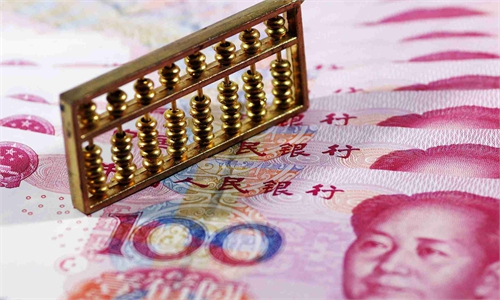US dollar hegemony starts to crumble amid developing economies' shift to other currencies for settlements

A view of Manhattan, New York Photo: VCG
Countries across the world have accelerated de-dollarization and increasingly shifted to other currencies that would provide stability, which, according to some experts, is a result of the US' irresponsible monetary policies, including monetary and fiscal splurges in the previous years and unrelenting sanctions on Russia by weaponizing the dollar.
Major economies have made various attempts to reduce their relianance on the US currency since the 2008 global financial crisis, but never in the last decade have there been so many countries making notable moves toward de-dollarization as there have been in the last two weeks.
China and Brazil have reached a deal to settle trade in their own currencies, ditching the US dollar as an intermediary, the AFP reported on Wednesday, citing the Brazilian government.
It's reported that the yuan assets have surpassed the euro to become Brazil's second largest in the country's foreign reserve, accounting for 5.37 percent of Brazilian central bank holdings at the end of 2022, compared with the euro's 4.74 percent share.
India, which the US aims to court with the aim of containing China's rise, is shying away from the dollar. India and Malaysia can now use the Indian rupee to settle trade in addition to other currencies, the Times of India reported on Sunday, citing the Indian Ministry of External Affairs.
In addition, finance ministers and central bank governors from the Association of Southeast Asian Nations (ASEAN) discussed the reduction of their reliance on the US dollar, euro, yen, and British pound for financial transactions, and started to trade settlements in local currencies at a regional meeting held last week in Indonesia, local media outlet the ASEAN Briefing reported on Wednesday.
Lost dollar charm
Most importantly, the dollar's decades-old dominance of international oil trade is beginning to fall apart, as a growing number of major economies have begun to trade in other currencies. China, on Tuesday, completed its first purchase of liquefied natural gas (LNG) from France's TotalEnergies using cross-border yuan settlement.
Tu Yonghong, a professor at the International Monetary Institute at Renmin University of China in Beijing, told the Global Times on Sunday that the yuan's internationalization is gaining pace after the buyers' pricing power on the market has shifted from the US to China at the global bulk commodities' market.
"The US has gone from being the largest importer of crude oil to being an exporter, while China has become the world's largest buyer of oil," she explained.
"The global de-dollarization drive is gaining pace. The US has constantly abused the dollar as an international reserve currency over the last two decades, which hurt other currencies and economies," Dong Dengxin, director of the Finance and Securities Institute at the Wuhan University of Science and Technology, told the Global Times. As the world heads toward multi-polarity and the US is no longer the world's largest trade economy, the dollar hegemony will fall apart gradually which seems an inevitable trend, according to Dong.
Tan Xiaofen, an expert at the School of Finance at the Central University of Finance and Economics, told the Global Times on Sunday that de-dollarization has shown an irreversible trend regarding international trade valuation and settlement.
"The conflict between Russia and Ukraine, the COVID pandemic, and other geopolitical factors have made countries rethink about financial security," said Tan.
Tu said that many countries have proposed to adapt to the needs of the development of the digital economy. Therefore, it is necessary to reform the international payment system, including the digital currency settlement instead of US dollar.
For example, the multiple central bank "digital currency bridge project" has moved from the experimental phase to the pilot phase. The project can realize point-to-point settlement using bilateral currencies, so it can greatly improve the efficiency of trade and reduce costs, according to Tu.
Irresponsible US policy
Backed by the world's largest gold reserves thanks to the Bretton Woods Agreement, the dollar was crowned as the world's reserve currency after World War II. Other countries rushed to accumulate dollar assets, believing it's a safe haven.
However, the US' irresponsible monetary policies have time and again caused negative spillovers to developing countries. The 2008 US sub-prime loans caused global financial crisis, the US Federal Reserve' ultra-loose monetary policy after the outbreak of the pandemic in 2020, and currently, the radical pace of its financial tightening, have all hurt other economies, severely.
The US flooded the globe with massive monetary and fiscal stimulus measures and then resorted to the most aggressive tightening of monetary policy seen in decades to tame runaway inflation, which have seriously disturbed the global financial markets. As a result, many developing economies that export commodities and borrow in dollars are facing risks including inflation, local currency depreciation, and capital outflows.
"In fact, the global de-dollarization has started a long time ago, and the recent aggressive interest rate hike policy of the US and the US banking system crisis have made countries worry about the robustness of the US financial system, which may lead to increased volatility of the US dollar," said Tu.
In addition, US-led international financial sanctions on Russia since the start of the Russia-Ukraine conflict have triggered a crisis of confidence in the dollar system, Tian Yun, an independent analyst, told the Global Times. He predicted that more countries are expected to reduce their dollar assets and resort to other currencies including the Chinese yuan in cross-border investment and trade settlements.
Analysts noted that various countries are trying some local currency settlement experiments by developing digital currency solutions to weaken the position of US dollar in international trade.
Yuan gaining weight
More economies are willing to adopt the yuan in clearing and payments, which is a "significant step" toward the internationalization of the yuan and reflects the international community's growing trust in the currency, Zhu Min, vice-chairman of the China Center for International Economic Exchanges, said on the sidelines of the Boao Forum for Asia last week.
Backed up with China's still-expanding huge economy, the yuan has displayed vigorous vitality and secured more global visibility. It has become the world's fifth-largest payment currency, the third-largest currency in trade settlement, and the fifth-largest reserve currency, official data showed.
While the dollar's borrowing cost has risen to an unacceptable level for many developing countries that borrow in dollars to grow foreign trade and their economies, China should take advantage of the relatively low-cost yuan financing to further boost the yuan's internationalization in the world, Tian said.
Yuan's weight in IMF's Special Drawing Right (SDR) increased significantly after it joined the SDR basket in October 2016. In 2022, yuan accounted for 12.28 percent in SDR, according to statistics from IMF.


